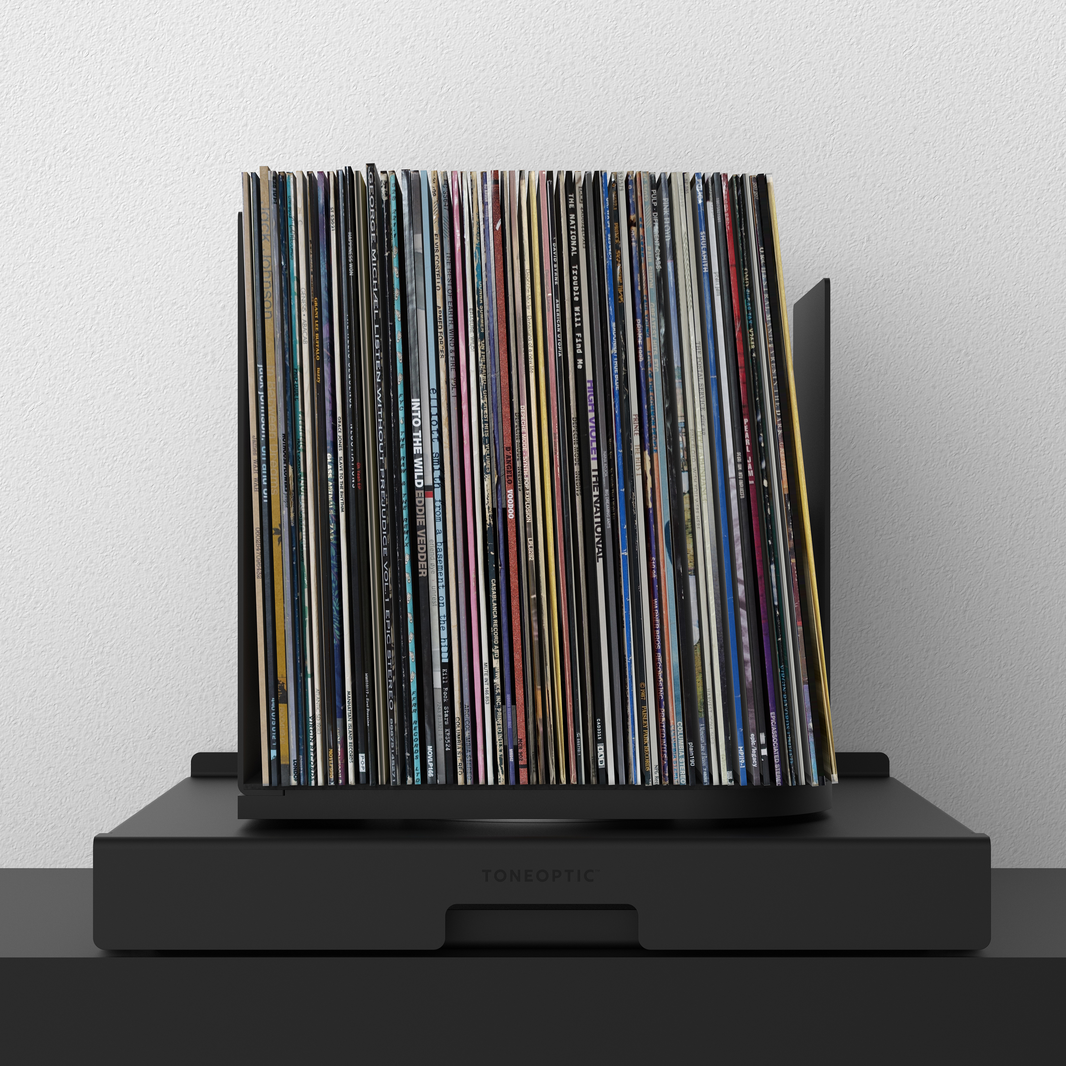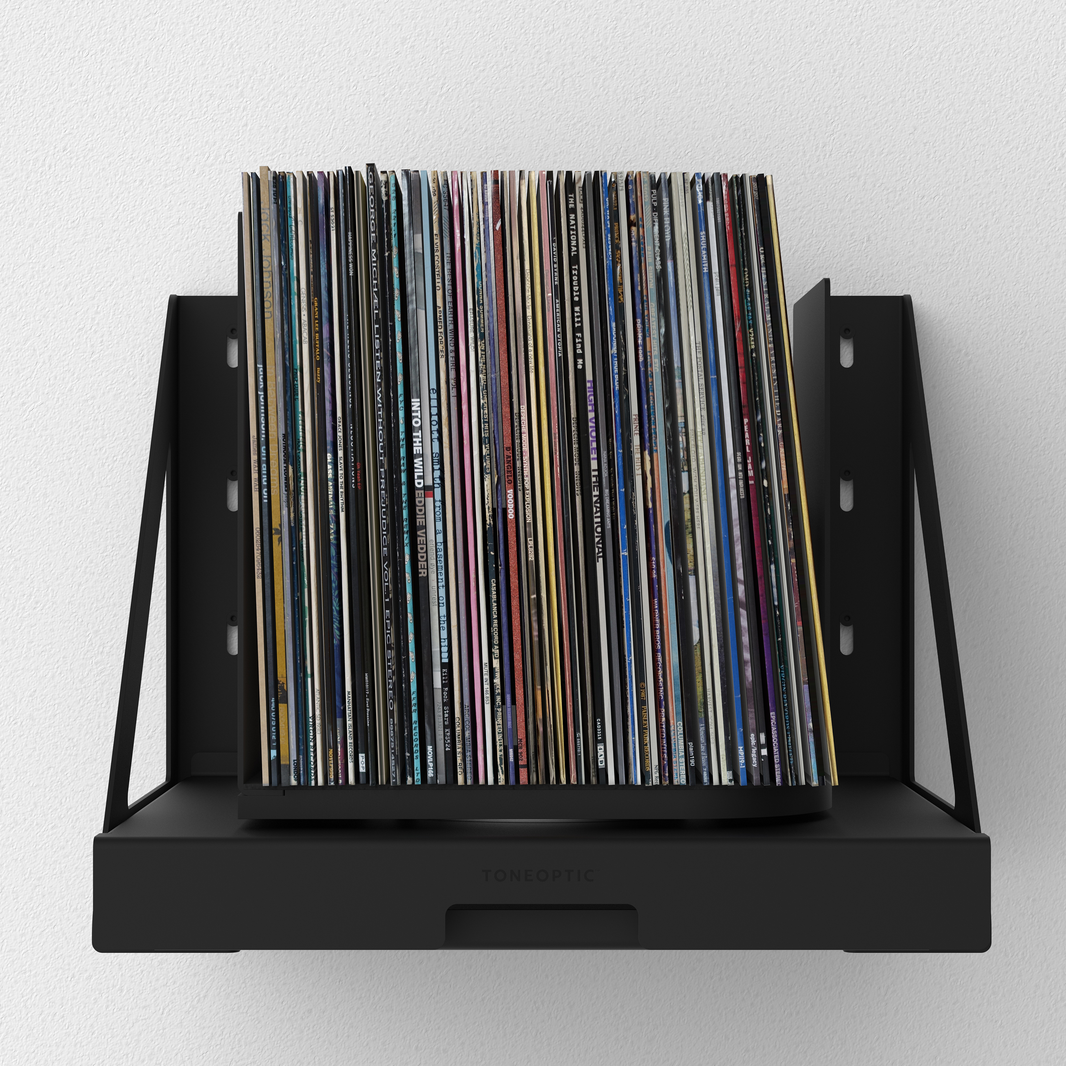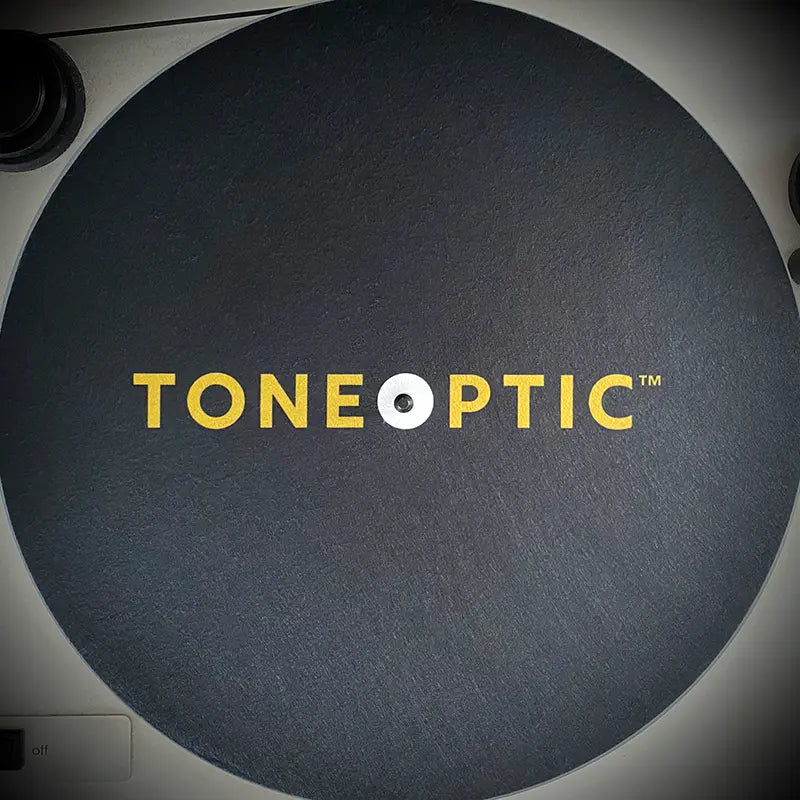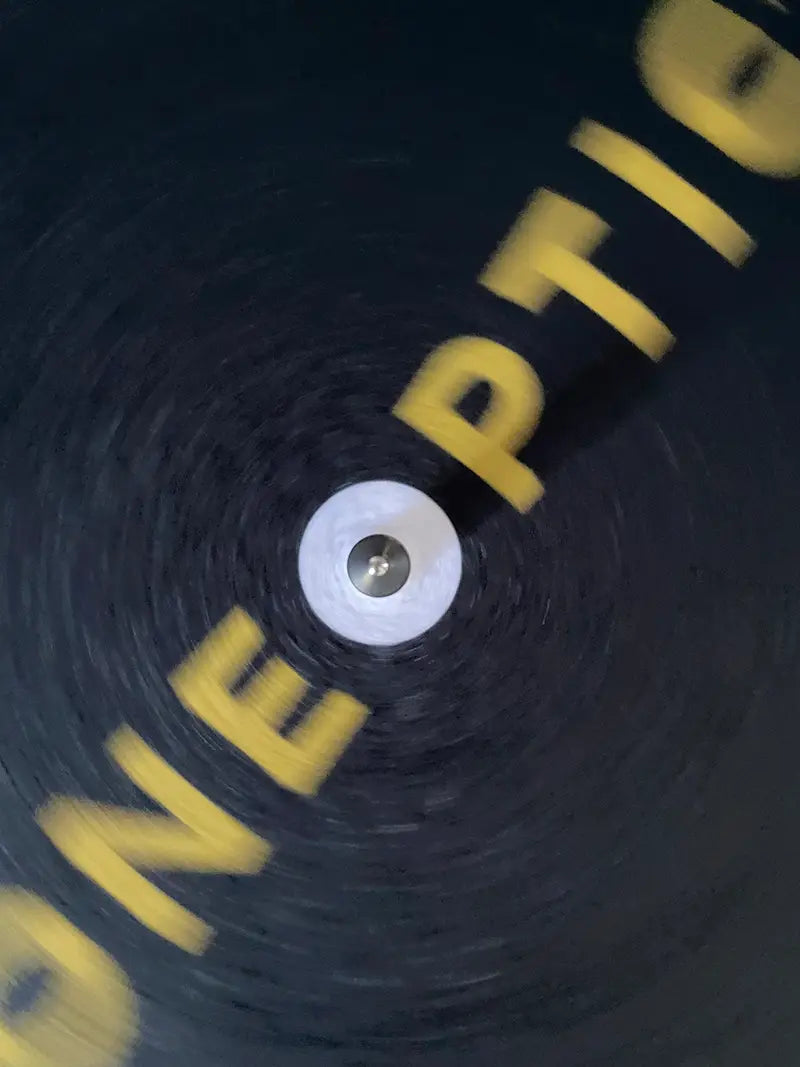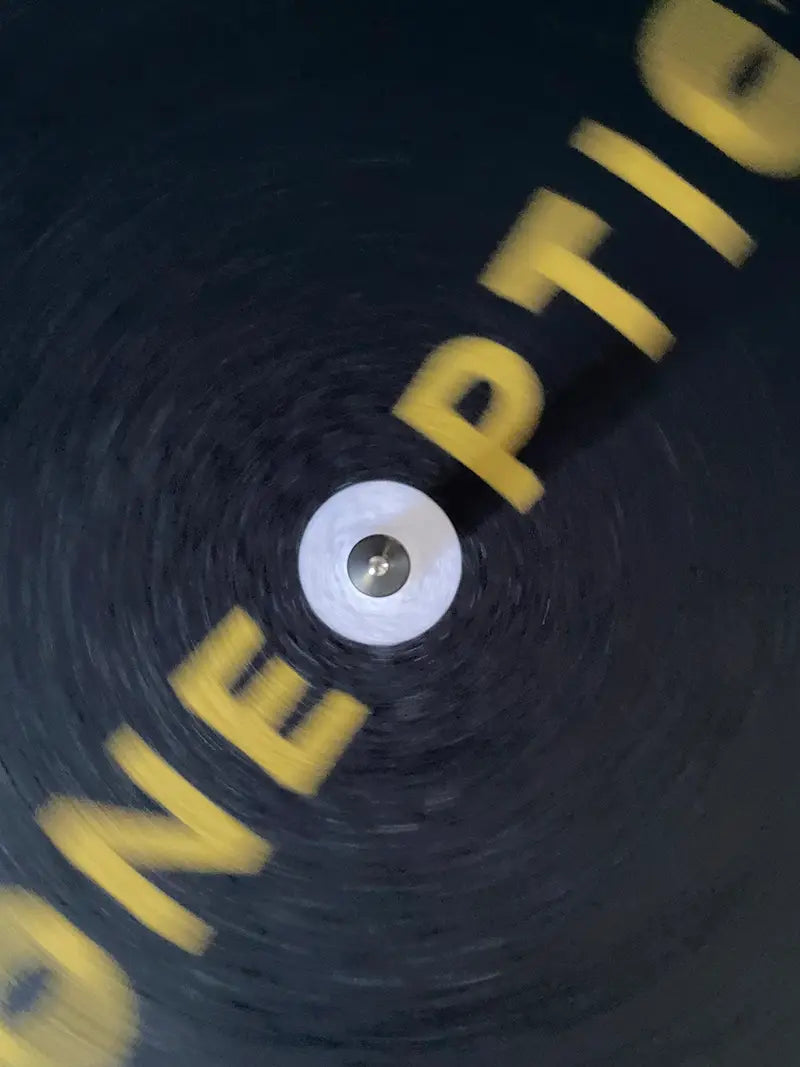
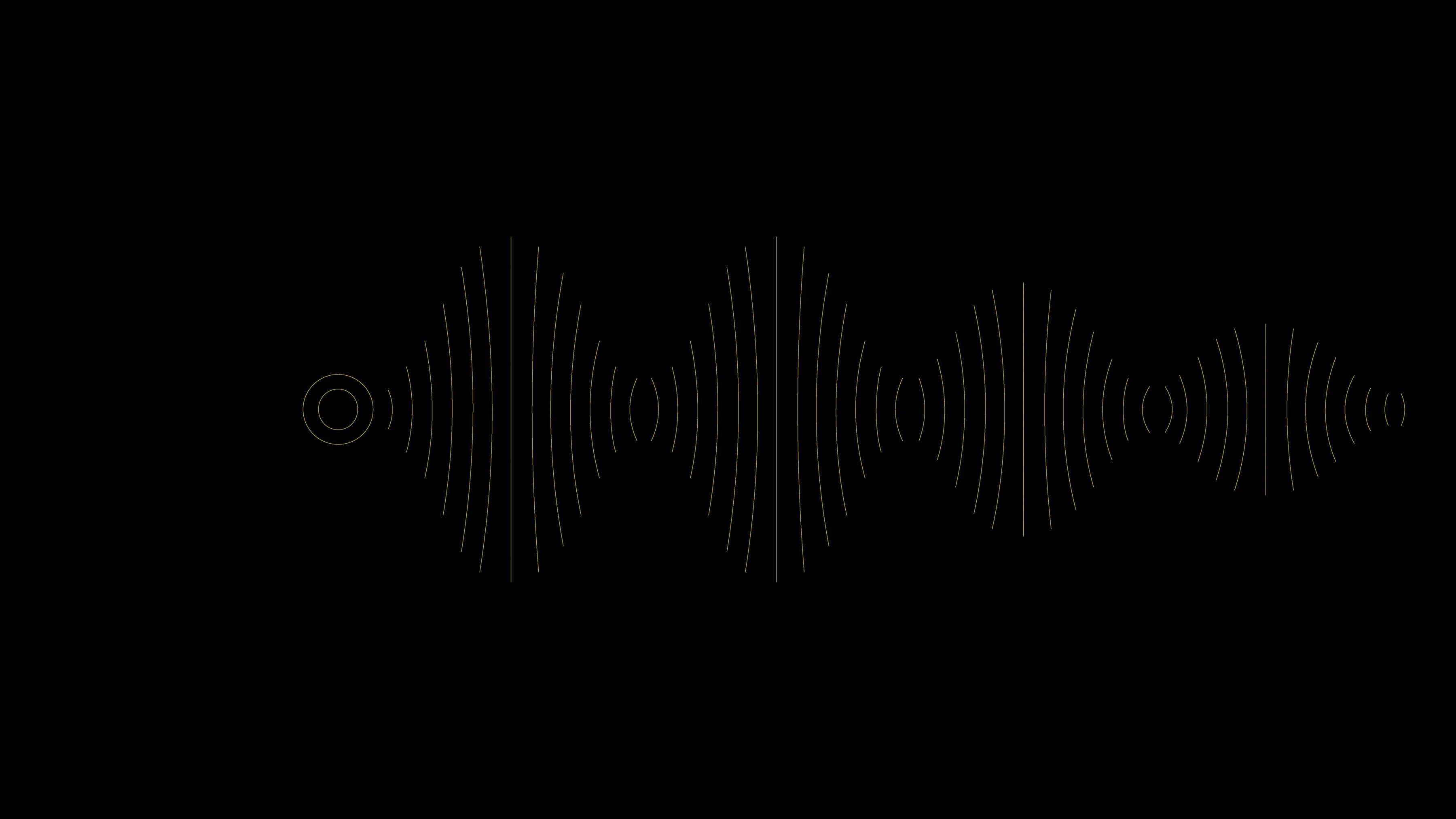
Dave Audé
Dave Audé has to date produced 133 #1 US Dance tracks, which means he has more number ones than any other producer on the Billboard Dance Club charts. He won a Grammy for his remix of Uptown Funk and has worked with everybody from U2 to Rihanna, Beyonce to Lady Gaga, Sting to Madonna, the list is endless.
And it all started with him establishing the Moonshine label together with Steve Levy in the early '90s which was tremendously influential in the EDM space.
In this inaugural episode of Sound Habit, I talk with Dave about the music he grew up with, his influences from Giorgio Moroder to the Eagles, how he had to get rid of all but 800 of his vinyl collection and he did so by giving it to some of his fans. We also talk about something that is at the heart of Toneoptic, the power of the record sleeve, how he listens to much of the same music anyone would in his spare time, and how his career started with being a fan of Erasure and he is now producing them.
To accompany the interview we created a playlist featuring almost all the songs and/or artists Dave mentions during the conversation. Enjoy in the background while you listen to the episode, or opt to read
Fabian Geyrhalter:
Welcome to the show, Dave.
Dave Audé:
Thank you for having me. It's always great to meet new people and I'm happy to be here.
Fabian Geyrhalter:
Oh, it's such a huge pleasure to have you as the very first guest on Sound Habit. I heard that as a teenager, you started off your music career, or I would say your love for music at that time, by learning how to play keyboard, because you really wanted to get a gig in a band like Erasure or Depeche Mode? That was kind of like…
Dave Audé:
That's perfect. You've obviously done some research and that's exactly correct. Growing up in the San Fernando valley in Los Angeles, listening to KIIS FM and KROQ, music was a huge part of my life and I was very fortunate to get a keyboard at the age of 13. My father knew a guy sort of in the music business and I played piano. So the obvious instrument for me to play would be a keyboard. And back when I was 13, the only thing I knew you could do with a keyboard musically, or I should say career wise, would be to be in a band. And in high school, one of my favorite bands was Erasure, which is pretty cool because I literally yesterday just finished producing a song for Erasure. So the cool thing is, my career has gone completely 360 degrees, or however you want to say it. And I can't even believe that I just said what I just said.
Fabian Geyrhalter:
No, I know. It's amazing. You ended up remixing Depeche Mode. I know you worked with Andy Bell, now you did Erasure, right? So it's not bad. It's not bad at all for realizing ones dreams, right? The way that you came about that.
Dave Audé:
I've had a couple realizations of multiple dreams, but as a kid I remember being in sixth grade, listening to the Grease soundtrack over and over and over, and the only way to listen to anything that year when I was, just to tell you how old I was, was vinyl. There was no, this was actually pre cassette. I think there was 8-track, but really it was vinyl. And you sit there and look at the double vinyl album from the Grease movie, looking at all the pictures, singing the songs, listening to all the songs over and over and over. I think I went back and forth between Summer Nights and Greased Lightning, because those were the big songs for a sixth grader. And again, one of those crazy things is years later, many years later, producing a song for Olivia Newton John. So, it's like, I've had a couple of those moments in my career and vinyl, definitely, I grew up with vinyl. That was a big format when I was growing up and its played a big part of my life.
Fabian Geyrhalter:
And you know, it's so interesting because you think about how kids grew up these days and you know that because you're a father of, I think, two kids, right?
Dave Audé:
Three kids.
Fabian Geyrhalter:
Three?
Dave Audé:
Three.
Fabian Geyrhalter:
There you go. So, you've got a lot of insight in that, but you know how back then when you were a kid and you opened that album and there was this visual component and it was this tactile component and you put the needle on the record, it was this whole, it was an experience, right? And it's kind of interesting how kids today in a way, TikTok becomes kind of like that new experience of this is how this is how a song becomes more than just music. It becomes kind of like this experience. So it's kind of weird, how these things change. But it's also nice to see how there's always something that surrounds songs that is bigger than just a song.
Dave Audé:
Yeah. TikTok's for sure taken the place of radio. Yeah, I guess, when I was a kid the way you would hear music is on the radio and then you would go, if you were lucky, your parents would drive you to the record store, whether it was at the mall or a strip mall or whatever. And you would go into the record store and just try and search out things, search out the songs that you heard on the radio, and then talk your parent into buying you something. My parents weren't buying me, I don't remember my parents buying me albums, I think the Grease album was the only album I remember them buying me. They would let me buy 45.
Fabian Geyrhalter:
Totally. Singles.
Dave Audé:
Which were singles. You like a song, for instance I can remember the first three 45s that I remember buying were, Pat Benatar, “Hit Me With Your Best Shot.”
Fabian Geyrhalter:
Oh, nice.
Dave Audé:
Devo, "Whip It." And an unknown band who had a one hit wonder, Quarter Flash, called, "Harden My Heart." Because those were the big songs of that week. But I remember buying those three 45s and playing them in my garage for all the kids on the block.
Fabian Geyrhalter:
Isn't it awesome?
Dave Audé:
Over and over.
Fabian Geyrhalter:
Over and over and over again, because those are the three songs that you have. It's pretty amazing. And it's so fun to hear your influence of KROQ back in the day, right? Because that was really...
Dave Audé:
Oh, my God. KROQ was the...
Fabian Geyrhalter:
I wasn't in LA, at that time, I was still in Austria. I came here in the 90's, but I mean, that was it, right? How they influenced 80's music was just unbelievable.
Dave Audé:
It was. KROQ was sort of playing the stuff that was blowing up on MTV. So it's like KROQ was blowing up, MTV was blowing up. It's the same stuff was getting played in both places.
Fabian Geyrhalter:
Totally. Absolutely. And going back to how you then ended up slipping into the music business, if I may call it that? You ended up, I would say, co-founding a co establishing the record label, Moonshine.
Dave Audé:
Yes.
Fabian Geyrhalter:
Which for those listening who were in that scene, that became a really, really, really big deal. I still have tons of trip hop compilations and I believe Mark Farina was on the label, right? So there were lots of Mark Farina, CDs.
Dave Audé:
Mark was on one of the sub-labels. He did a lot of... Mark wasn't putting out…
Fabian Geyrhalter:
Oh, Mushroom Jazz, right? That was it, I think.
Dave Audé:
He was doing his mix, his mixes, he would do a DJ mix because Moonshine was really the king of the DJ mix. So, before there was internet, you could go purchase these, our 60, 74 minute long DJ mixes from your favorite techno and house DJs to listen to in your car.
Fabian Geyrhalter:
Right. Right. I remember I had a Goldie compilation, which by the way, it blew my mind because last week Goldie came out with a new song and it's actually really great. And it's like, "Now there's drum and bass back." It's like, "Who knew?"
Dave Audé:
Yeah. Some of the best records, I've done two or three drum and bass records in my career. And probably some of the best records I've ever done, and I've only done a couple.
Fabian Geyrhalter:
Well, I'm going to have to look those up and make sure we add them to the list because, for yourself and for my listeners, since is still a new podcast, we will have a playlist going along with the podcast with a lot of the artists that we're mentioning in our interviews, so that we can take a sneak peek at that. But when you, at the beginning at Moonshine, that was kind of like the first gig for you in the music industry and you were really doing everything, right? And you were super hands on involved in the manufacturing process I heard. And this is fascinating to me, and likely any vinyl nerd, so were you actually cutting the vinyl, were you cutting the lacquers?
Dave Audé:
Yes.
Fabian Geyrhalter:
Whoa!
Dave Audé:
This is a crazy thing. So my first job in the record business was at Moonshine Records and the guys who own the label realized that I was a technical guy. So basically they said, "Look, we're going to build you a studio in," when the label first started, "We're going to build a studio inside the building that the record labels in. You get to use the studio, but in return you're going to work a regular nine to five job during the day. And you're going to be in charge of all our manufacturing, because we don't know what we're doing with manufacturing. We figured you're a studio guy, you can learn really quickly or figure out all the manufacturing."
So very quickly, overnight, I had to learn all about manufacturing, CDs, cassettes, mastering, and vinyl was big. So I had to learn where to cut vinyl, how to cut vinyl, all the ins and outs of there's some people that know what they're doing. There's some people that don't know what they're doing. Test pressings, dub plates, all this fun stuff that goes along with manufacturing vinyl. And then the artworks, center label and sleeve design and everything to go along with manufacturing, CDs, cassettes, and vinyl I learned very quickly and I was in charge of manufacturing.
And I would have to figure out how many things we needed to manufacture. And hopefully we didn't manufacture too many because you don't want to be having things sit around forever, which happened many times.
Fabian Geyrhalter:
Right.
Dave Audé:
And you didn't want to run out of things and then not having any to sell. So, I was thrown into this job of manufacturing. I never, in a million years, would've thought I was going to be in charge of manufacturing.
Fabian Geyrhalter:
What a thrilling experience and I mean, for you, it was the best of both worlds. You got a freaking studio. Yeah, you had to slave away trying, most probably anxiety driven of like, "How do I make this happen? How do I do all of this?" And on the other hand, you had your playground, which you always, that was most probably a dream come true.
Dave Audé:
Yeah. Well, I had a studio at home, so when I got job, most of my gear was in my parents' house and they were ready for me to get all this gear out of their house, so it was perfect timing. I had a place to put all my gear and work. And so I would work at the record label during the day. And then when 6:00 hit, I would go in the studio and be in the studio till two or three in the morning making music for the original artists that the label was signing.
Fabian Geyrhalter:
Amazing. Amazing. And fast forward to today and what, you produced 133, I think is the latest number, number one U.S Dance tracks? Which means you have more number ones than any other producer on the billboard dance club charts. You've won a Grammy for the absolutely sick remix of Uptown Funk. That was just amazing. And just now, I believe in the last couple of days, given your Instagram feed, you just got a third Grammy nomination, which is amazing.
Dave Audé:
Third Grammy nomination for a song that not a lot of people know about, unless you're a huge fan of Demi Lovato and Ariana Grande. A song that I remixed earlier this year called, Met Him Last Night, which for a couple weeks was a single. And then as things happen at record labels, something happened and they change to another song. But the good thing is my remix came out and all Demi's and Ariana's fans went crazy streaming it and it worked out pretty good because somebody liked it, so I got nominated for a Grammy.
Fabian Geyrhalter:
So good, good for you, congrats. Congrats on that. And despite working with all these big names, we've already dropped some, but Rihanna, Beyonce, Lady Gaga, Sting, Madonna, wherever, it goes anywhere. You still happen to find time, or you make time, to be grounded and to do DJ gigs all the time. When you DJ do you ever spin vinyl at all anymore?
Dave Audé:
Never.
Fabian Geyrhalter:
Those days over, right?
Dave Audé:
Those days are over. I carried vinyl, I carried briefcases of vinyl through airports.
Fabian Geyrhalter:
It's heavy.
Dave Audé:
For 15 years. And I said to myself, "One day, I'm not going to have to carry all this stuff." Because the vinyl didn't go, I didn't go right from vinyl to computer. I went from vinyl to CDs. So Pioneer introduced the CDJ in 2006.
Fabian Geyrhalter:
Yep. Yep.
Dave Audé:
And so I was the first DJ in the United States, or one of the first DJs in the United States, to have the CDJ. And they brought it to my house and I obviously fell in love with it because I knew that now I'm going to carry CD booklets, right? So the crazy thing is, couple crazy things about this was, well, that wasn't true because no club obviously when the thing first came out, no club had the CDJ.
Fabian Geyrhalter:
Yeah. So you had to carry that, right?
Dave Audé:
Right. So what happened is I got two briefcases, that I had specially made for the CDJ, which I still have. And so I would have to now carry the two briefcases through the airport because the clubs, it took a year, even a little bit more than a year, for all the clubs to actually get the CDJ. And then, at the time, me and all my DJ friends who have been playing vinyl for so long, we didn't like the idea of putting as many songs as you could on a 74-minute CD and just doing that, we were burning one song onto one CD still because it made us feel like we were still playing vinyl.
Fabian Geyrhalter:
Hmm. That's super interesting. That's funny.
Dave Audé:
And so we would get all these new records and the computer was obviously in play now. And so iTunes was in play, and Beatport and all these other places you could get music, so the music would be on the computer and now we were burning and I was buying hundreds of CDs every month.
Fabian Geyrhalter:
Just raw, right?
Dave Audé:
Blank CDs.
Fabian Geyrhalter:
Yeah. Yeah. Yeah.
Dave Audé:
Yeah, to burn one song onto a CD. We'd have booklets, these big, giant CD booklets that we carry in a backpack, it was kind like DJing still with vinyl because you put one CD in a CDJ and then go look through your CD book. Kind of like you were looking through vinyl.
Fabian Geyrhalter:
It's familiar, yeah. And everyone, there's only one, one remix in each one of them. So it's easy. You know exactly what you're doing rather than running into something else.
Dave Audé:
Yeah. It was cool and I love playing CDs. So the thing that was lost going from vinyl to CD was the vinyl jacket.
Fabian Geyrhalter:
Yeah.
Dave Audé:
So looking at the artwork on 12 inch jackets, which is a big part of when you're playing vinyl, you're kind of flipping through all this vinyl really quickly and just the colors kind of triggered something in your mind that made you want to play that record. Or you would remember things by the jacket of the record.
Fabian Geyrhalter:
Yep.
Dave Audé:
But if you're looking at a bunch of burned CDs, they all look the same, except for what you've written on the CD.
Fabian Geyrhalter:
And bringing this back home to all the vinyl collectors listening, that's kind of why we love vinyl, right? Because CDs are a little bit soulless, right? They're just these silver discs and there's no, you don't have that emotional connection with it because that cover is missing.
Dave Audé:
Right.
Fabian Geyrhalter:
Flipping through vinyl, when you go into a store and you look through vinyl, crate digging as they call it, when you go through it, that's half the fun. It's just seeing these visuals and being transported into the 60's, the 70's, the 90's, right? Seeing test pressings and all that stuff. But it's all about that. It's all about seeing that jacket when you flip through, I totally agree.
Dave Audé:
You still don't see it. You still don't. Even with, obviously things have artwork, songs have artwork and stuff, but there's definitely something missing. That connection that you made between the song and touching the vinyl and flipping it over and reading the credits. By the way, I'm the co-chair of the producer at engineers wing for the Grammy's here in Nashville and something that we're discussing right now, I don't want to get too far on the subject, but a big thing that's missing right now in music, an issue, is that all the metadata, all the information that you used to find on the back of a 12 inch vinyl is missing.
Fabian Geyrhalter:
Hmm.
Dave Audé:
It's not being translating from the song to the listener. So before you would just look at the CD booklet or a 12 inch vinyl jacket, and you'd get all this information.
Fabian Geyrhalter:
Yeah.
Dave Audé:
Who played the song, who mixed the song, where it was recorded, who wrote the song, who produced the song, the record label, all this stuff's on there, the lyrics, all that stuff was on these jackets.
Fabian Geyrhalter:
Case in point, Dave, I remembered in the back of, I'm a huge Depeche Mode nut, I've got 400 something Depeche Mode records, it's kind of like that was my thing, right? And I remember that you remixed Depeche Mode and I couldn't find it for the life of me. And that's exactly why, because now I went into Discogs and that's basically, they have all the database of everything.
And I very quickly realized, "Oh, it's because it was the DJ Dan remix." But you were remixing it with him. You sampled, "People are People" in there. And it was very memorable for me, but I knew that in the back of my head, that's exactly why. Because now you just stream something or you have an MP3 or whatever it is. It's like you don't get that information. And it's so crucial.
Dave Audé:
Yes. DJ Dan was one of the artists at Moonshine that I was producing all his records and he was a very good, still is a very good friend of mine, and so I was doing all Dan's music. And so the label hired Dan to do a remix of Depeche Mode, there was a couple songs. The one I remember is "Precious."
Fabian Geyrhalter:
Yep. Yep.
Dave Audé:
And there was one more and I can't even remember what it was, but so unfortunately that's one band I wish I, there's not a Dave Audé remix of Depeche Mode out there.
Fabian Geyrhalter:
Yeah.
Dave Audé:
But that's one band that I definitely dream, there's not very many bands left, artists, I haven't remixed. They are definitely in my top five.
Fabian Geyrhalter:
When the day comes and I have Dave Gahan or Martin Gore on the show, I will make sure to let them know. Or Daniel Miller of Mute, that would be even better, right? Go straight to the source. So, no, that's, that's great. But the DJ Dan remix, you had your hands in that, right?
Dave Audé:
Yes, no, no, no. I did the remix and it's Dan's names on it.
Fabian Geyrhalter:
Right, right, right. You did remix Depeche Mode, it's just not the label, your brand is not on it.
Dave Audé:
I did it under the DJ Dan name.
Fabian Geyrhalter:
Right. Exactly. Exactly.
Dave Audé:
Dan doesn't do what I do in the studio. Let's just leave it at that.
Fabian Geyrhalter:
Right. Right. Makes total sense. And what you do in the studio, you created really a niche for taking on any genre, right? And giving it your special danceable treatment, regardless if it's country or pop or whatever. And you said in an interview, and I really, really love that, you said that you're not trying to do the cool stuff. You're basically making your clients happy by keeping the majority of their songs intact and that is really unusual in an industry that has lots of creative egos involved. You do a remix, and I'm not dissing that at all because it's wonderful, having super creative remixes, where it takes you even a minute to understand which song that is, and there's a space for that.
Fabian Geyrhalter:
But you kind of went the other way, where the cool kids didn't go and you're like, "Wait a minute. Why does no one just celebrate these songs and make them, more sellable, more danceable, more enjoyable on the dance floor?" And I thought that was really, really neat.
Dave Audé:
There's multiple ways to go around producing records. And so there's, and nobody's right, there's no one way to do it. There's no right way to do it. The record I just got nominated on, the Demi Lovato Ariana Grande, I totally flipped it. In other words, my remix sounds nothing like the original, but if you listen to my remix of Reba McEntire, "Fancy," it sounds like the original, just maybe better updated, a little bit faster, on steroids.
Fabian Geyrhalter:
Yeah. Yeah.
Dave Audé:
And that's most of the time what I do is I try to keep the original song intact. And so I, because at the end of the day, it's not about me. It's about promoting the artist and the artist song. It's not about promoting Dave Audé. People, and other remixers, kind of use this opportunity to promote themselves, which is fine. But my number one goal is to just do something awesome for the artist and the artist song.
Fabian Geyrhalter:
And talking about some of the music that you listened to growing up, and then the music that you surround yourself with day by day based on your work, what do you listen to in private, these days, on a Saturday afternoon, sipping a glass of, I guess, Añejo tequila, because that's what you talked about.
Dave Audé:
Man, yeah. I love Añejo, yes.
Fabian Geyrhalter:
I got that right.
Dave Audé:
You got that right. You've done your research, but I... Here's the thing. I try to listen to music every day. I don't really have too much time to sit down with a glass of tequila, because I have three kids, but I wish I did. But if I do, I'm kind of all over the place. I want to hear what other people are doing, whether it's a new Kasey Musgraves record or the new Adele record, that I think everybody's been listening to the last two weeks.
Fabian Geyrhalter:
Yep.
Dave Audé:
Or the new ABBA record that everybody's been listening to for the last month. I'm just like everybody else. I'm not any different than everybody else. I'm just listening to... I'm interested to hear what is coming out from everybody. And I'm not just listening to dance music or techno or house all the time. I do listen to a lot of that, but I do listen to a lot of everything. And of course I grew up in the 80's, so if I'm driving in the car, I probably listen to 80's a bunch because that's what I grew up on. And it makes me happy.
Fabian Geyrhalter:
Right. That's the sentimental value. Right. It kind of works for everyone, right? How big is your vinyl collection today? Did you get rid of all of it at some point or? And also on the same level, sorry, because it's just too exciting for anyone listening, if you were part of a record label, do you still have all of these test pressings and these... Those were amazing jams back then.
Dave Audé:
Yeah. I have a bunch of stuff still and like I said, so I was DJing vinyl, strict only vinyl, for 15 years. And I was probably buying anywhere from 5 to 30 records singles a week. So I had a lot of vinyl and about eight or nine years ago, my wife and I just, we couldn't, I didn't have more room. So I got rid of most of the stuff that I wasn't playing or wasn't sentimental to. And so I put up messages on my social pages eight or nine years ago and gave away vinyl to three or four lucky individuals that drove immediately to my house. And I handed them crates and crates and crates of stuff.
Fabian Geyrhalter:
No way. Wow.
Dave Audé:
Yeah. But I, I still have about 800 records. So I kept stuff that was really, like my first Daft Punk record for instance, or stuff that if I was going to do a set today that I would still play, big, big records that I was playing on vinyl. So a lot of breakbeat stuff, a lot of techno, a lot of 90's house, and early 2000's stuff that I was playing in clubs. So I kept stuff that I was that I played a lot, but I got rid of stuff that I just didn't. When you're a DJ or you're buying stuff every week and a lot of times you might play something once. A lot of records you don't even play because you get home, you put it on, and you go, "Ugh."
Fabian Geyrhalter:
Yeah, totally.
Dave Audé:
Yeah. It wasn't really what I thought it was. And then what do you do with it? It goes in a box and just sits there. So, I gave away most of that stuff and I still have about 800 pieces of vinyl.
Fabian Geyrhalter:
Is there an artist that is the most represented in your collection? Is there one artist where you feel like you've got a lot of that artist?
Dave Audé:
Well, it would be from artists that were really huge '91 to 2006 when I was buying vinyl. So I would say people like Norman Cook, I have a lot of Norman cook. I have a lot of my friends, Crystal Method, for instance, I was playing a lot of Crystal Method records. So guys that were making a lot of records in those years, I have a lot of stuff from them, Stuart Price, I have a lot of his stuff. So just people that I was playing a lot, Olav Basokski, was a guy who was putting out records on this label called, Work Records. Yeah, just, Antoine Clamaran, another DJ that I played a lot of during those years. So these are just artists, DJs and remixers and producers that I played a lot of their stuff during those 15 years.
Fabian Geyrhalter:
And when you talked about, you and your wife going through the records, or more you and your wife saying, "Out with the records." And you had to go through them.
Dave Audé:
Yeah.
Fabian Geyrhalter:
You talked about some of them had sentimental value. Are there one or two records in your collection where you feel like those you will never give away, like they're super, you just cherish them, either because they're really rare or because you have a huge sentimental value associated with it?
Dave Audé:
Well, well that would be the first record that I ever made, a Dave Audé record, was a song called, "Floor Filler Tune." So, I have some vinyl of that. So I obviously won't ever get rid of that, even though I probably have never, I haven't played that song since I made it.
Fabian Geyrhalter:
Yeah, that's fine.
Dave Audé:
I think the first vinyl I ever got from somebody was one of my mom's boyfriends gave me a copy of ELO Discovery on vinyl, so that means a lot to me. Obviously all the Erasure stuff that I have on vinyl, and I think I have a lot of Duran Duran stuff too, because kind of like the same time in high school, Duran Duran and Erasure were the big things on vinyl for me. And then the first three things I ever, the first three vinyl that I bought, full album vinyl were, and it's funny because I bought them all three at the same time for Christmas when I was in eighth grade and it was, The Go-Go's, "We Got the Beat," Foreigner “4”, and Rick Springfield, the "Jessie's Girl" album. So for some reason I asked for all three of those on vinyl, I got them and I asked, I think I got them on cassette too, because the same Christmas my grandmother got me a Walkman.
Fabian Geyrhalter:
Oh yeah.
Dave Audé:
And so that was a big thing. That was the explosion of the cassette. But, by the way, up until that moment, I was getting everything on vinyl. So, I got vinyl that Christmas and cassette that Christmas. And I think from then on, I was getting probably cassettes until I started DJing.
Fabian Geyrhalter:
And it's funny because one of my questions would have been, what's a guilty pleasure record? But you already listed some. There was Rick Springfield.
Dave Audé:
No, I have so many... I'm definitely a guilty pleasure guy. I do love ABBA and that's, I think ABBA is maybe cool again? But for a long time people, ABBA was not something people really admitted to listen to.
Fabian Geyrhalter:
Yep.
Dave Audé:
And I think, I don't know, Rick James, Street Songs album, maybe that's something that's a guilty pleasure or some? But to me it's not a guilty pleasure. I love Rick James.
Fabian Geyrhalter:
It's just a pleasure.
Dave Audé:
I love him.
Fabian Geyrhalter:
Right. Exactly. Yeah, yeah. Yeah. So, what do you think about the new ABBA album? Because I forced myself to listen to it as well. And it was, well, you tell me first.
Dave Audé:
Well look, I really love the older ABBA stuff and I think it's great that they came back and made a new album. I don't... It didn't hit me the same way as some of those older ABBA classics.
Fabian Geyrhalter:
Yeah.
Dave Audé:
The sentiment was still there, but I just don't think the vocals were there, in my opinion.
Fabian Geyrhalter:
Hard to pull off right at this point to give them credit.
Dave Audé:
God bless them.
Fabian Geyrhalter:
Exactly.
Dave Audé:
God bless them for trying to give their fans something, but I think they definitely took way too much time off. I don't know they must have reasons for taking, was it 40 years or something? A crazy amount of time off. And I just think that at a certain point it's like, they should have made a record 20 years ago.
Fabian Geyrhalter:
Yeah. No, totally. Totally agree.
Dave Audé:
And it's sad they didn't, because they're so talented. Look, the talent is still just the voices aren't what they were 20 years ago, 30 years ago.
Fabian Geyrhalter:
Yeah. No, I totally agree. What are some of your top albums? And I love to ask that, especially to someone who seems to be single minded in his work, because it's always about this song. But the idea of albums, for you personally, and maybe those were some that you already mentioned, but what are some of the top albums that kind of shaped you?
Dave Audé:
Well, and I kind of mentioned a couple already, but Eagles, which Eagles album I'm going to say, Oh, my God, hold on. My brain's not my brain. My brain does this. I didn't write everything down today, Hotel California album, was big for me. And that when I say album, not just Hotel California song, I mean the whole album.
Fabian Geyrhalter:
Right.
Dave Audé:
So that was a big album, whole album, for me. Which I had on vinyl. And the whole thing sitting there dropping the needle, not fast forwarding, actually listening to the whole thing would be a big album for me. And again, I'm probably not the guy to give you like super crazy, never heard of that album before stuff. But the next album is probably another fairly obvious thing to most people I would think.
And that's Beach Boys, "Pet Sounds" album, and that's another big album for me. And this is just stuff that I grew up on and really shaped my childhood and I already mentioned ELO Discovery. So those were, you know big albums, drop the needle, listen to the whole thing, turn it over, listen to the next side.
Crazy enough another piece of vinyl that I loved, which I got was, and I'm just trying to remember the name of the record, because it was Donna Summer and it was the album that was it Bad, was Bad Girls the name of the album? It might have been. No. Yeah, it was, it was Bad Girls. So the Bad Girls album that had, it had Bad Girls and it had Hot Stuff.
Fabian Geyrhalter:
That's right. It was '79 or something like that, 80.
Dave Audé:
For some reason, that was just, at that time when I was in the fourth grade, "Dim All the Lights" was on it. It was a big, big, big record. It was the record that I remember taking out of the sleeve. And I remember putting it on the turntable, playing those songs, and just sitting there and looking at the sleeve listening to this phenomenal Giorgio Moroder production.
Fabian Geyrhalter:
Mm-hmm. Yep. He was the man.
Dave Audé:
But not knowing who Giorgio Moroder was.
Fabian Geyrhalter:
Of course.
Dave Audé:
Not knowing what a producer was. Nobody told me about this, but just something that I knew that I loved whatever was happening coming through the speakers. So those were just some great memories for me.
Fabian Geyrhalter:
It's so neat Dave, to kind of look at what you're doing now and where you're coming from musically and how it strangely, magically, all perfectly connects. It just makes a lot of sense listening to some of your stuff now that you're doing today. And then going back in your history of what you grew up with. And subliminally I'm sure there's a lot of influence that one can hear.
Dave Audé:
Yes, definitely.
Fabian Geyrhalter:
And we're slowly coming to an end here, but I know you just got the Grammy nomination, but what are you working on currently that you are excited about? Or, what's next for you that you're really looking forward to?
Dave Audé:
I'm always working on different things and I'm always excited about obviously the things I'm working on right now. But something I'm very excited about is just finishing a song for the next Erasure album coming out next year. So that's definitely a big part of my life going in full circle.
Fabian Geyrhalter:
They are such work horses, huh? Erasure, they just, this year they had all of these remix albums. The year before, I think they had an album. Talking about the opposite of ABBA. Erasure just keeps pushing.
Dave Audé:
Yeah.
Fabian Geyrhalter:
I'm very much looking forward to, are you actually producing the entire album or are you producing some songs?
Dave Audé:
Well, we'll see what happens. We've been talking about that for a long time. We're starting with one song this week, Andy and I have written about another eight songs. And so we'll just... It's about getting Vince to sort of, I have to, Vince is the gatekeeper, obviously. He's one of my favorite, mostly respected producers ever.
Fabian Geyrhalter:
Yep.
Dave Audé:
Because as you know, he founded Depeche Mode and Yazz [NOTE: Dave meant Yazoo] And Erasure, just phenomenal, phenomenal production songs, everything. He's a, I would never, ever want to step on his toe. So it's really about doing everything alongside him and making sure that I respect Vince.
Fabian Geyrhalter:
No pun with respect. That was one of the big Erasure...
Dave Audé:
No pun. No pun with the respect. Yeah. But I'm super excited about that. And I'm just finishing an album, a Dave Audé album, that I'm going to put out next June with some of my friends, LeAnn Rimes, Jesse James Decker, hopefully a song with Adam Lambert. Another, another friend of mine Luciano, who I've done a lot of records with. A song with Andy bell, of course. Nicole Scherzinger. Maybe RuPaul, we've got a couple songs, so that's coming out next, June, Pride Month, excited about that. And then I'm just working on stuff, a lot of new stuff here in Nashville, a couple Nashville artists and the usual stuff I'm always working on something new.
Fabian Geyrhalter:
Yeah. Yeah. You're not a workaholic. You're just someone who really enjoys what you do it sounds like, and I can very much relate to that. And listen...
Dave Audé:
I do.
Fabian Geyrhalter:
... Dave, I couldn't have wished for a better first guest. I hope that everyone enjoyed it. Thank you so much for taking the time today and giving us a peek behind the curtain of your record collection, of your tastes, and just a really, really great conversation. So thank you. Be well, and yeah, talk soon and keep doing what you're doing. I can't wait. I can't wait to listen to that Erasure production. That I'm super, super excited about.
Dave Audé:
Me too. You and me both.
Fabian Geyrhalter:
I hope Vince too. And then everything pans up.
Dave Audé:
Yes. Man, it's so great to meet new people and I've had a great time. Thanks for having me.
Fabian Geyrhalter:
Thank you so much.


